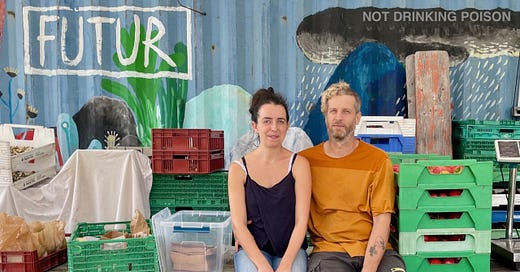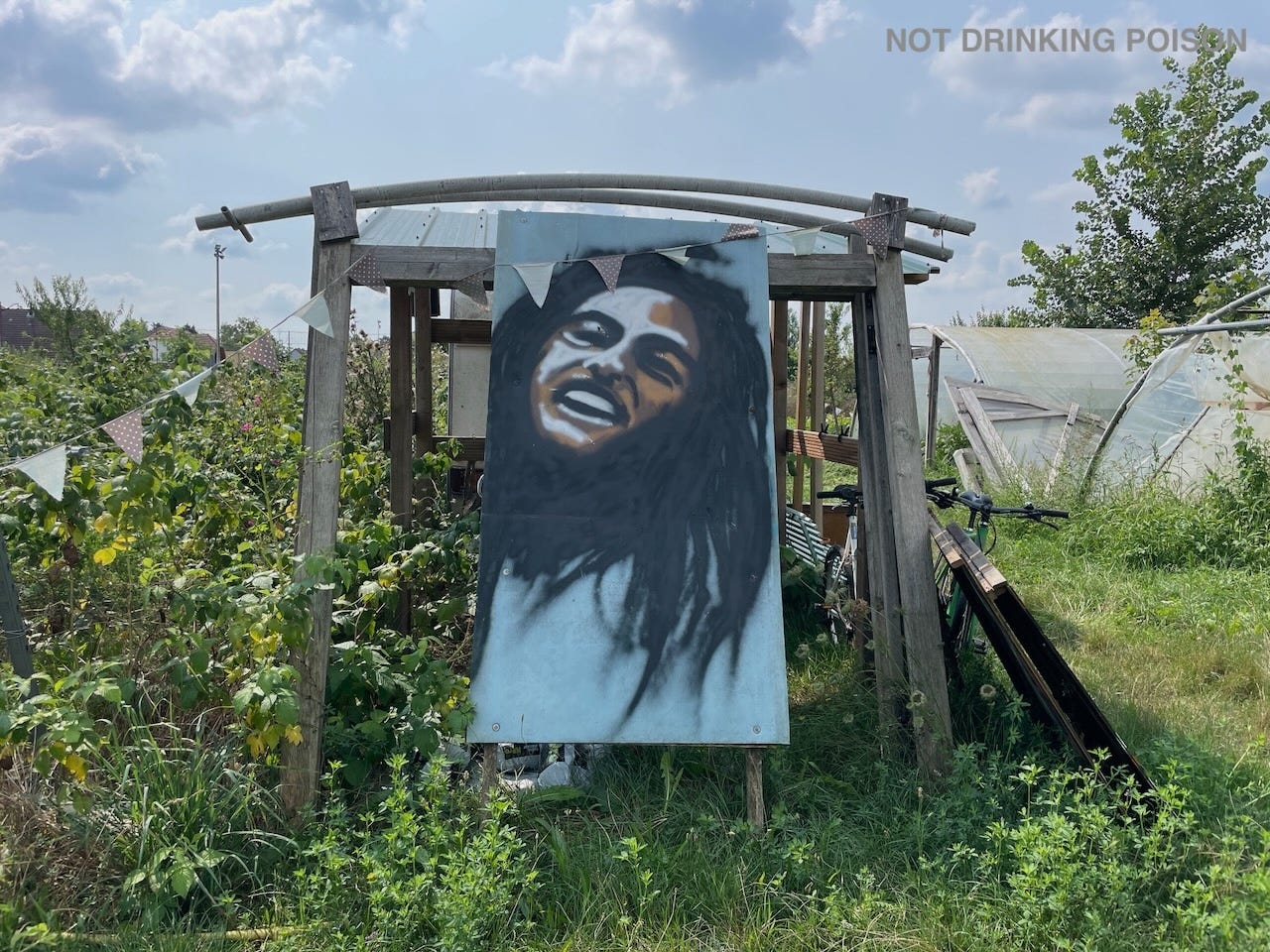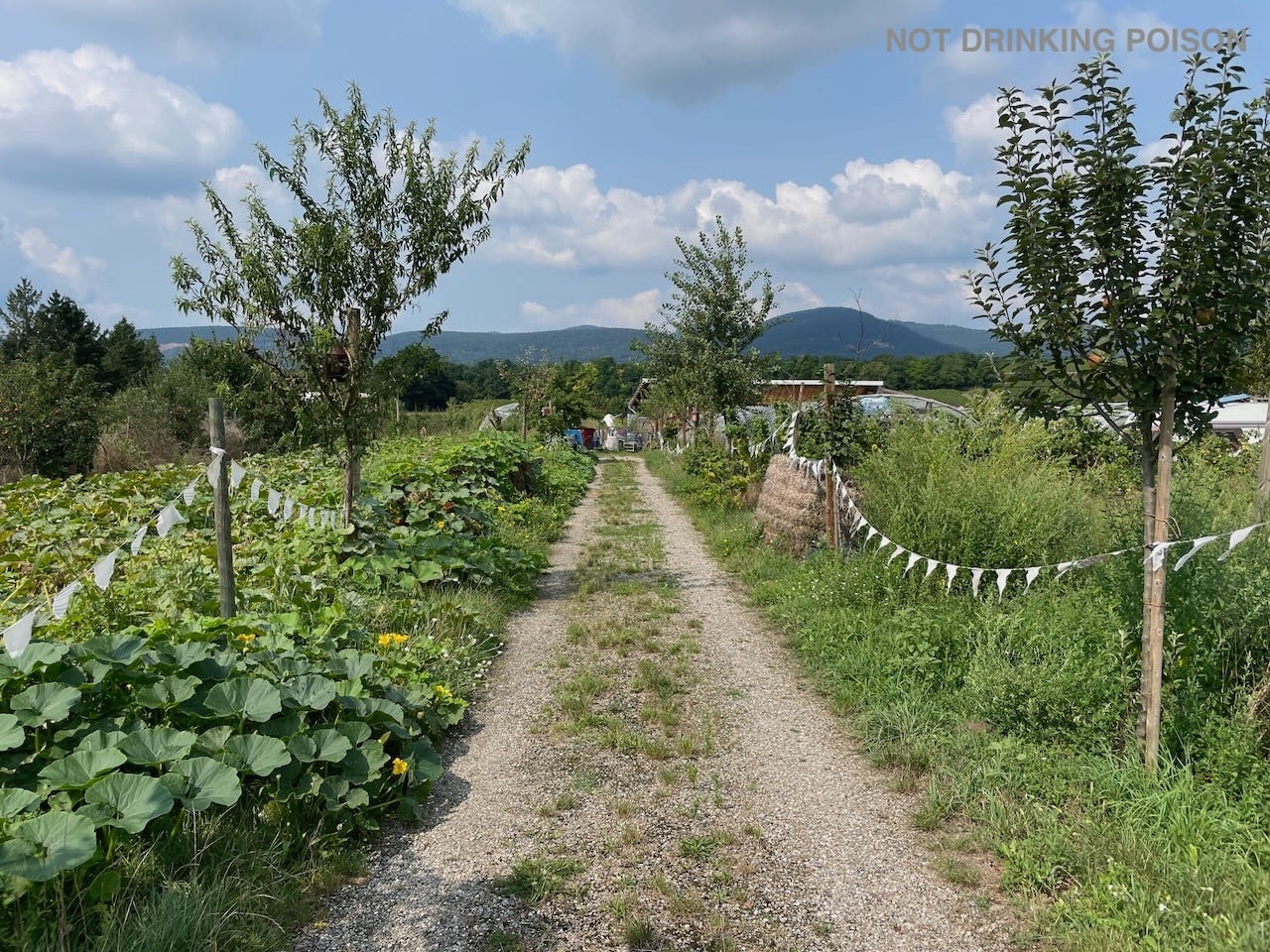A Different Song: Les Jardins En-Chantant
Meet Herrlisheim-près-Colmar market-gardeners turned vignerons Gabriel and Léa Willem, whose commitment to autodidact, handmade natural wine production shows just how rare that is in Alsace.
Les Jardins En-Chantant is a small, 1.6ha market garden in the Colmar suburb of Herrlisheim-près-Colmar, founded in 2014 by Gabriel and Léa Willem. The couple began producing wine in 2018 from purchased grapes; since then they have begun farming a total of 4.5ha, of which a third is located in the Beaujolais. Their picturesque bottles are instantly recognizable, thanks to an avalanche of preambulatory text, as well as the unusual choice of clear glass flacons resembling grappa bottles.
Neither of the couple derive from a farming or winemaking background. Instead, they’ve brought to their neo-paysan lifestyle a winning gusto and idealism. These attributes are also present in their free-spirited wine production, which possesses an endearing, rough-hewn, homemade touch that is basically unprecedented in Alsatian winemaking.
I first tasted their wines at Salon Brut(es) in Mulhouse in November 2023, where I was wowed by their potently expressive gamay. I finally found a chance to visit one afternoon this past August, where I encounterd Léa determinedly preparing market baskets through a bout of morning sickness. Gabriel and I toured the garden and cellar as he recounted the struggles and convictions behind the couple’s plucky, laborious neo-rural idyll.
Quick Facts
Les Jardins En-Chantant comprises 1.6ha of market gardens and 4.5ha of vineyards. The name is French play on words between “the enchanting gardens” and “the gardens, while singing”
The vineyards are spread through one 1.5ha site in Quincié-en-Beaujolais (the Beaujolais-Villages sector west of Mont Brouilly) and seven small sites in the Bas-Rhin in Alsace.
Grapes farmed include gamay, riesling, pinot noir, auxerrois, pinot gris, and pinot blanc. The couple also conduct small négociant purchases, of grapes including muscat, gewurztraminer, and cabernet mitos.
Total production is generally around 15’000 bottles per year.
The couple’s winery is an improvised site in the courtyard and basement of Gabriel’s family home in Herrlisheim-près-Colmar.
The Willems do not practice de-stemming. Reds generally macerate for about four weeks, orange wines about three, both in tanks situated in the courtyard.
All wines are pressed with a manual vertical press. Most see aging in some form of oak barrel or demi-muid.
No sulfites or other additives are employed at any stage of wine production.
Gabriel Willem has a contrarian predilection for challenging, oxidative, off-dry elixirs, though this profile doesn’t characterize the entire range by any means.
SING A DIFFERENT SONG
Few would confuse Herrlisheim market-gardeners turned vignerons Gabriel & Léa Willem for archetypal salt-of-the-earth farmers.
A native of Herrlisheim, Gabriel moved to Paris at age eighteen to pursue careers in acting and music, while Léa, a Parisienne, worked in theatre costume design in the capital. Gabriel quit the theatre after a months-long stay in Burkina Faso with a visiting European troupe left him with an uneasy sensation of triviality; he then focused on his musical career until the birth of his first child and the illness of his mother impelled him to move home. He says he hit upon the idea of starting a farm with little forethought, after hearing that land in town was available.
“Like a lot of people, I knew the local corn farming wasn’t good. I’d started to be more involved in local ecology,” he says. “I figured maybe it would be good to stop talking and do things.”
He considers the decision naive, in retrospect. The reality of acquiring farmland in France is complicated. It took Willem a year of administration and improvised project planning to win the rights to purchase the former chemically-farmed cornfield on which Les Jardins En-Chantant now sits.
“It was a bit like the television series Dallas,” he says. “When you manage to get the land, then the corn farmers arrive in pick-ups with guns and all.”
He says it helped that he was a native of Herrlissheim. To a degree.
“It also didn’t help, because people knew I’d been in Paris and I wasn’t a farmer,” he says. “In their eyes, I was a bit of a wanker.”





